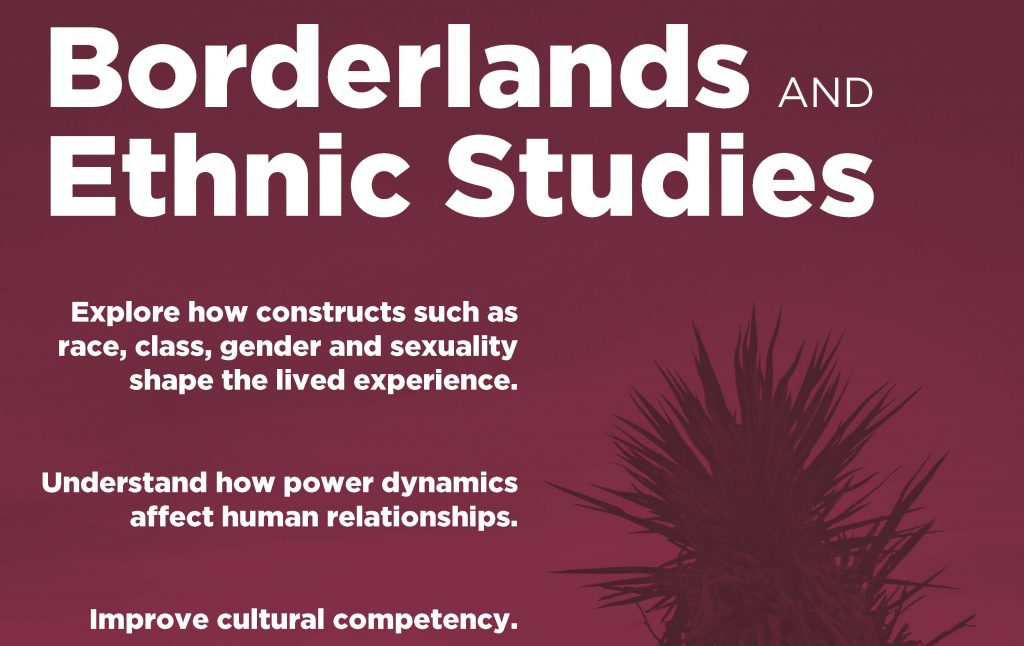Graduate Certificate

Borderlands and Ethnic Studies (BEST) offers a multidisciplinary graduate certificate that critically explores the social, historical, cultural, and legal ways communities experience and navigate social constructs such as race, gender, and sexual orientation. These constructs permeate life, are entrenched in social structures and institutions, and shift and mutate over place and time in ways that reproduce existing power relations. The program outlines and analyzes the history, cultural production, politics, and consequences of racialization and identity formation from a diasporic and transnational/transborder approach that remains rooted in a place-based, Borderlands imperative.
Coursework
The certificate addresses a growing need for knowledge in the areas of cultural competency, equity and inclusion, critical thinking and problem solving, and effectively working with diverse populations in various fields such as: education, government, law enforcement, health, environmental justice, communications, social work, law and policy, public history, business and social entrepreneurship. Within the field of education, currently employed teachers and future teachers will be trained in historical and contemporary knowledge of Borderlands and Ethnic Studies through a locally-relevant approach. Teachers will also be instructed in field-relevant pedagogical tools and curriculum design and implementation. This certificate serves a growing cadre of teachers as well as all others pursuing employment in the public service sector. The certificate is comprised of 15 credits of graduate level work.
To obtain the graduate certificate students must complete the following courses plus one elective (15 total credits):
This seminar explores the roots, logics, and administrations of racism within the U.S. context, locally along the border, and framed within a larger global and historical context. In addition to race, other social locations such as gender, class, and sexual orientation are explored as intersectional. The course uses traditional lecture format, multi-media, guest lecturers, and engaging activities inside and outside the classroom to apply materials in tangible and impactful ways.
This seminar introduces the practice of indigenizing research methods by looking beyond the canon of Eurocentric methodologies that have often trapped marginalized communities outside of normative time frames. Through the deconstruction of colonial apparatuses and their influence on research methods, the class explores key concepts in decolonizing research to move us to new understandings of communities according to indigenous traditions that privilege ancestral ways of knowing.
This seminar provides a basic understanding of theoretical foundations of Borderlands and Ethnic Studies. It also examines borderlands theorizing to critically engage the border not simply as a physical barrier meant to regulate migration, but the economic, cultural, spatial, and metaphorical borderlands that informs us on larger processes of membership, belonging, identity, politics, and dehumanization linked to social structures and institutions. Social movements in the U.S. that sought to illuminate social inequalities and social justice issues are explored. The course investigates the underlying causes and sources of these social movements as they relate to reconceptualizing race and the borderlands and their overall impact on society at large.
This seminar is designed to culminate the graduate certificate by summarizing knowledge and experience garnered in pre-courses: BEST 510, 511, 512. Students will be asked to write a reflective essay at the start of the course that highlights 1) materials and ideas that have most impacted the student throughout the core courses, 2) discuss how the elective course complemented and expanded materials and ideas from BEST core classes, 3) what materials and ideas remain challenging to grasp, and 4) what kind of culminating project the student would like to complete. This essay will be the foundational document to carry the student through the semester, along with close guidance provided by the instructor as well as peer feedback.
